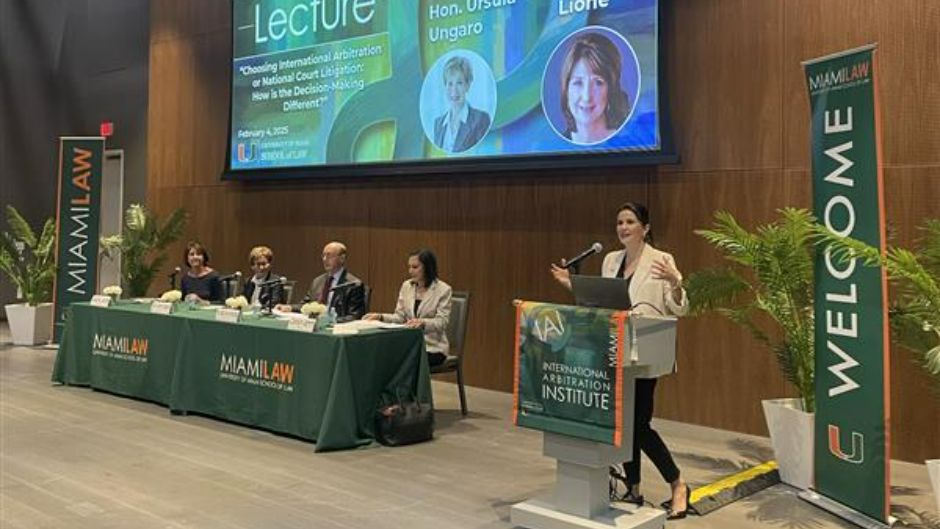An insightful panel discussion took place at the University of Miami School of Law's 2025 White & Case International Arbitration Lecture recently, drawing a diverse audience of legal professionals and students eager to understand the complexities of decision-making in judicial versus arbitral contexts. The event, hosted by the White & Case International Arbitration LL.M. Program and International Arbitration Institute, featured a distinguished lineup of speakers, each bringing unique perspectives on the intricacies of dispute resolution.
Interim Dean Patricia Sanchez Abril opened the session by stressing the importance of the "convening. And nothing's better than convening around thoughtfulness, around ideas, around dialog, around conflict resolution. And in Miami, around international issues, convening students and academics, members of the practice and faculty and staff."
Carolyn Lamm, J.D. ’73, a prominent figure in international arbitration, partner at White & Case, and distinguished faculty co-chair at the University of Miami School of Law in the White & Case LL.M. Program in International Arbitration, began the discussion, saying, "Of course, one of the most important things in international arbitration are the arbitrators and choosing the arbitrators. And I wanted to focus on the question of how is decision-making different between judges and national courts?"
Lamm shared her insights from the advocate's perspective. Describing her extensive experience representing foreign clients and sovereigns, Lamm shed light on the nuances of advocacy in arbitration versus litigation. She discussed the skills necessary for effective representation in both arenas, emphasizing the need for advocates to adapt their strategies based on the chosen dispute resolution forum.
The discussion shifted to Gail A. Lione, senior counsel at Dentons, who contributed a unique "user's perspective." Drawing from her vast experience as a former general counsel, Lione emphasized the strategic considerations organizations must weigh when selecting dispute resolution methods. She elaborated on aligning dispute resolution strategies with broader business objectives, including risk management and governance. Lione's insights underscored that the choice between litigation and arbitration is not merely legal but also a business decision that can significantly impact companies' long-term strategies.
"From a procedure standpoint, I might want this resolved fast. But if I'm a respondent, I might not want to resolve so fast. If I'm in your court, I'm going to have less control over my timing," Lione said to the lone judge on the panel. "If I am in an arbitration, I can probably delay and delay. And so that is a benefit if timing for me is important."
Professor Albert Jan van den Berg, a partner at Hanotiau & van den Berg in Brussels, honorary president of the International Council for Commercial Arbitration, and distinguished faculty Co-chair at the University of Miami School of Law in the White & Case LLM Program in International Arbitration, dove deeper into arbitral decision-making. He shared his experiences as an arbitrator, highlighting the procedural flexibility and confidentiality that arbitration offers compared to traditional court settings. van den Berg illustrated this point by referencing several high-profile international cases where arbitration proved a more effective resolution, particularly in cross-border disputes involving multinational corporations.
van den Berg reminded the audience that when arguing damages, "treat the arbitrators as if they have zero knowledge about economics," he said, "because in my experience there are a number of my colleagues that are very good in the law, but numbers, they have some hesitation. Financial experts can be very helpful, but they are more expensive than lawyers."
Judge Ursula Ungaro, a retired United States District Judge and a Boies Schiller Flexner LLP partner, opened the session by discussing the fundamental differences between judicial and arbitral decision-making. Her extensive career, which has seen her navigate complex commercial litigation, provided valuable insights into how judges approach cases compared to arbitrators. Ungaro emphasized the importance of understanding the strengths and weaknesses of each approach, underscoring that the choice between going to court or opting for arbitration often hinges on the specific characteristics of the dispute at hand.
Ungaro made a good point about arbitration being different from litigation because of financial interest.
"I think that arbitrators are caught between a rock and a hard place," Ungaro said. "Of course, some of it goes back to a marketing problem. They want to get hired again. My experience as an advocate in arbitration is that arbitrators do not control the forum like a judge. They are more accommodating to the lawyers."
Throughout the panel, the speakers engaged in a lively discussion, addressing audience questions and offering practical advice on navigating the complexities of dispute resolution. Attendees departed with a deeper understanding of the factors to consider when choosing between judicial and arbitral pathways and a comprehensive view of the decision-making "kitchen."
The event served as both an educational platform and a networking opportunity for those in attendance, fostering discussions on contemporary challenges within the legal landscape. With the panelists' wealth of experience and knowledge, participants were left well-equipped to make informed decisions about the best course of action for resolving disputes in their professional lives. The University of Miami School of Law's commitment to such high-caliber discussions reinforces its role as a leading institution in legal education and thought leadership.
Read about Miami Law's Litigation, Arbitraton, and Dispute Resolution area of study.

